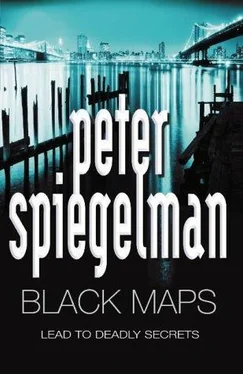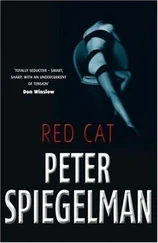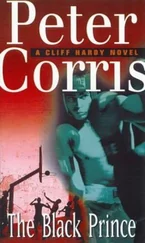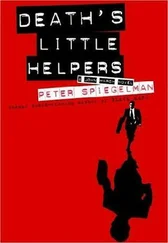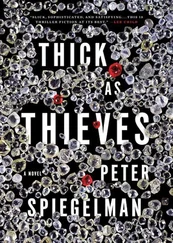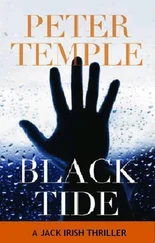Peter Spiegelman - Black Maps
Здесь есть возможность читать онлайн «Peter Spiegelman - Black Maps» весь текст электронной книги совершенно бесплатно (целиком полную версию без сокращений). В некоторых случаях можно слушать аудио, скачать через торрент в формате fb2 и присутствует краткое содержание. Жанр: Криминальный детектив, на английском языке. Описание произведения, (предисловие) а так же отзывы посетителей доступны на портале библиотеки ЛибКат.
- Название:Black Maps
- Автор:
- Жанр:
- Год:неизвестен
- ISBN:нет данных
- Рейтинг книги:4 / 5. Голосов: 1
-
Избранное:Добавить в избранное
- Отзывы:
-
Ваша оценка:
- 80
- 1
- 2
- 3
- 4
- 5
Black Maps: краткое содержание, описание и аннотация
Предлагаем к чтению аннотацию, описание, краткое содержание или предисловие (зависит от того, что написал сам автор книги «Black Maps»). Если вы не нашли необходимую информацию о книге — напишите в комментариях, мы постараемся отыскать её.
Black Maps — читать онлайн бесплатно полную книгу (весь текст) целиком
Ниже представлен текст книги, разбитый по страницам. Система сохранения места последней прочитанной страницы, позволяет с удобством читать онлайн бесплатно книгу «Black Maps», без необходимости каждый раз заново искать на чём Вы остановились. Поставьте закладку, и сможете в любой момент перейти на страницу, на которой закончили чтение.
Интервал:
Закладка:
“Something?” he asked. I nodded.
“You going to tell me which one, or do I have to guess?”
“Show me the first five,” I said. He clicked on each one, and each time he did a new window opened with an abstract of the document he’d picked, and an image of the original.
Mine was number three. It was the letter from Pierro to Dias, informing him of the establishment of the credit line. It was identical to the one in the fax. According to the abstract, the original had been found in offsite storage, in files from the correspondent banking department, specifically in the files of its former chief, Alan Burrows.
“Who else requested these?” I asked. Neary pointed and clicked a few times.
“Just the feds, about a year ago. I told you, they want anything involving Nassouli.” We were quiet for a while.
“That it?” he asked. I nodded. “So, two of them we don’t have, and no one besides the feds has accessed the third. Nothing here tells me that this shop was the source of your documents, John. I think you’ve got to look elsewhere.” I put away my notebook and leaned back.
“You guys find documents from Nassouli’s files in offsite storage?” I asked.
“Some, yeah,” Neary answered warily.
“So he didn’t call the offsite stuff back for shredding, huh?”
“No time, I’d guess,” said Neary.
“The documents I’m asking about are pretty old-old enough to have gone to offsite storage. But you didn’t find any of them there. How come?” Neary thought about this, not happy with where I was headed.
“Beats the hell out of me. Could be he never sent them offsite, and they got shredded with the rest of his shit. Could be he didn’t give a damn about them, and tossed them years ago. The MWB people weren’t that good at record-keeping.”
“So I keep hearing. But it could also be the documents were here, and never made it into your system,” I suggested.
“Bullshit,” Neary said. He sighed heavily and shut down the PC. Then he leaned back in his chair and clasped his hands across his stomach and looked at me. “What else can I tell you?” he asked. I thought about it for a while, not really sure. The office was silent except for air coming through the ceiling vents in a conspiratorial whisper.
“This and the fourth floor-that’s all that’s left of MWB in New York?” I asked.
“Pretty much,” Neary answered. “Nearly everything else has been cleaned out and sublet.”
“Where was Nassouli’s office?”
“On forty-four, one of the trading floors.”
“Anything left there?”
“Not for long. They signed a sublease on it last week, and construction starts week after next. Equipment and files are long gone. There’s not much left to see, but you can have a look if you want.”
We went to the lobby, switched elevator banks, and rode up to forty-four. Another uniformed guard greeted Neary and buzzed us in. Neary took a big ring of keys from his desk as we passed. We went through a metal door and down a short corridor. This floor was the same shape as the lower ones, but had been built out very differently. A band of small offices ran around the doughnut’s inner edge. They were windowless, but had glass walls that looked out on the rest of the floor. More, larger, offices ran around the outer edge. These also had glass walls, but they had windows as well, and sweeping views of the harbor and the uptown skyline. Sandwiched between the glass offices was the trading floor itself-five rows of long desks, separated by narrow aisles, running down each side of the doughnut.
If the lower floors had had an abandoned feel, this one seemed vandalized. The offices were nearly bare, with only some scarred furniture and the occasional moving box remaining. The blinds and drapes that had covered the glass walls lay in heaps in some offices, and in others hung twisted and askew. The carpeting was stained and torn in many places, and in many places was missing altogether. Rows of acoustical tile were missing from the dropped ceiling. The light fixtures that weren’t mangled on the floor were mostly dark. The forest of technology- screens, keyboards, elaborate phone consoles-that usually covers any trading desk had been cut away from these, leaving behind a tangle of exposed cable and some cleaner patches on the filthy desktops. The trading desks themselves were like junked cars, gutted and left for scrap. The air was cold and stale and smelled vaguely like a bus station.
We picked our way across the trading floor to a big corner office. It had its own little waiting area and a glass-walled conference room adjoining it. Neary found a key on the ring and unlocked the door. This office was in better shape than the others. The drapes and carpets and light fixtures were intact, and the furniture that remained-a massive teak desk, topped in polished stone, two huge credenzas, and a set of teak bookshelves-looked undamaged. Neary stepped to the windows to take in the view.
It was spectacular. To the north, the Brooklyn Bridge, the Manhattan Bridge, the sweep of FDR Drive running along the East River, and a chunk of the Brooklyn waterfront-all glittered in the clear night. To the east there was more of Brooklyn, the shadowed mass of Governor’s Island and the distant lights of the Verrazano, across a dark expanse of harbor. We looked out in silence.
“Nice views, but not much else,” Neary said after a while. I looked around the office. A large moving box stood, unsealed, on one of the credenzas.
“What’s in the box?” I asked.
“Stuff Nassouli left behind when he split. Desk doodads, those Lucite tombstones from some deals they’d done, and a bunch of pictures that were hanging on the walls, mostly of himself at parties.” Neary reached into the box and took out an eight-by-ten color photo, nicely mounted between glass plates. It showed people at a party, a high-end one. The men were in black tie, the women in shimmering, gauzy things. I recognized the Temple of Dendur, at the Metropolitan, in the background. In the foreground was a man I took to be Gerard Nassouli.
He was handsome and, in that picture, could have been anything from thirty-five to fifty. The photo showed him from the waist up, and he seemed heavily built, but not fat. He had a broad face, with heavy-lidded, slightly almond-shaped eyes, a straight, prominent nose, and a wide mouth with full lips and lots of white teeth. His skin was dark, and his glossy, black hair and brows were thick. He wore a mustache and a Van Dyke beard, both closely cropped. He was smiling in the photo, and seemed to be speaking with someone outside the frame. In one hand he held a champagne flute aloft, his arm raised in mid-toast. His other arm was wrapped around a willowy blonde, slightly taller than he, who looked barely legal. She smiled faintly, her eyes closed and her head inclined toward his. His large, manicured hand rested proprietarily on her hip.
There was something sleek and ursine in Nassouli’s immaculate hair and dark features and well-fed bulk, and I realized that he reminded me a bit of Rick Pierro. But where Pierro projected an open, what-you-see-is-what-you-get quality-a kind of friendly, regular-guy bear-there was something vaguely menacing and slightly leering about Nassouli- a piratical bear. A bear from the Hellfire Club.
“Here he is with an ex-mayor at a Knicks game. And here he’s with a model at-what, the Belmont? And here he’s with the girl from that game show, at some other black-tie thing.” One by one, Neary took photos from the box and placed them on the tabletop. “Nassouli at some club; another black-tie party; here he’s at Lincoln Center. At the Guggenheim. At the Garden.”
The photos were identically mounted, between glass plates, and in all of them Nassouli was in the foreground. While he never looked directly into the camera, I got the sense he was always aware of its presence. The events in the photos spanned a couple of decades, and you could trace the passage of time through the changing fashions worn by the people in them. Only Nassouli himself seemed changeless. Perhaps slightly thicker, a bit fuller in the face in the more recent ones. Otherwise he seemed not to age. Dorian Gray bear.
Читать дальшеИнтервал:
Закладка:
Похожие книги на «Black Maps»
Представляем Вашему вниманию похожие книги на «Black Maps» списком для выбора. Мы отобрали схожую по названию и смыслу литературу в надежде предоставить читателям больше вариантов отыскать новые, интересные, ещё непрочитанные произведения.
Обсуждение, отзывы о книге «Black Maps» и просто собственные мнения читателей. Оставьте ваши комментарии, напишите, что Вы думаете о произведении, его смысле или главных героях. Укажите что конкретно понравилось, а что нет, и почему Вы так считаете.
